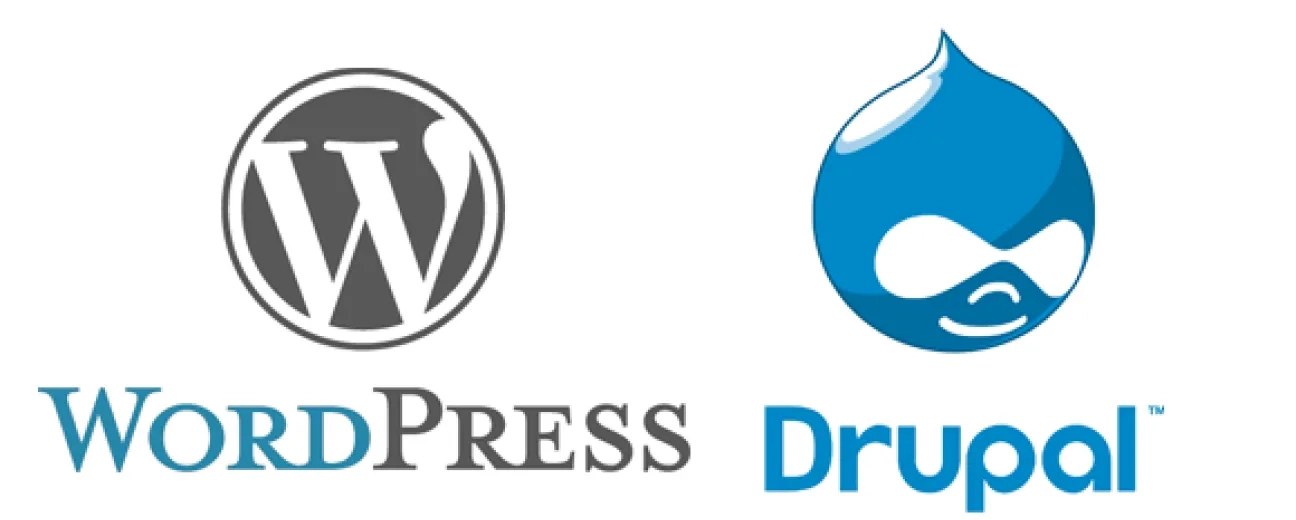
We’re excited to hear your project.
Let’s collaborate!

There’s an age-old battle going on between the best platforms to build your website: Wordpress vs Drupal vs Joomla. Today we’ll tackle just the first two and compare some of their features in order to help you with your decision. Remember, picking the right platform for your website is essential since you’re likely to invest a lot of time and effort into it. If you already picked a platform, you can also read more about our top 8 Drupal web development tools.
In the late 2000s Wordpress was the preferred choice for most online projects, e-commerce websites, personal blogs and the preferred platform for web development companies. Back then websites featured minimal content types and most pages featured just a content block with a few buttons. Nowadays, times have changed and web development is becoming more and more focused on user experience than simplicity – this means more content types, more features and plenty of attention to the user interface.
These needs made Drupal so popular in recent years – here are a few things that need to be mentioned in the Wordpress vs Drupal battle.
The biggest difference in the Wordpress vs Drupal analysis is security. Plenty of government websites are built in Drupal simply because it offers site scale and enterprise-level security. Even Whitehouse.gov is built with Drupal.
On the other hand, Wordpress offers limited security as hackers can use vulnerabilities from plugins to crack their way through and wipe your website – most vulnerabilities take place at the server level. Drupal features a few notable hosting applications that help manage any security risks, Pantheon and Acquia.
The first thing you need to figure out when it comes to responsive development and responsive design is how your images are managed – your images won’t necessarily scale perfectly when viewed on different screen sizes. Both Drupal and Wordpress offer solutions to making images responsive but the solutions are different.
When working with Drupal, you can set your images sizes from the admin panel with the use of the Image Style module. The advantage here is that you don’t have to modify your PHP files to set your sizes. Both Wordpress and Drupal are designed agnostic which means you’ll pretty much build your themes however you want. You can try a starter responsive theme which can help speed up your workflow.
If you plan on having a dedicated mobile theme for your website, both platform offer starter themes to help you along. There are plenty of Drupal mobile themes available on drupal.org and as for WordPress, WPTouch is the norm.
Now, the biggest difference between Wordpress vs Drupal is how the content is handled on mobile devices – When using Drupal you can create other content fields for a page that will simply display when viewed from a mobile device.
It’s also worth stating that you should place your Drupal mobile theme in a sub-domain such as m.drupaldomain.com - Wordpress mobile themes can run on the same subdomain.
Content editing on mobile is rather easier with Wordpress, making it an excellent choice for blogs and other personal websites.
Neither platform has a definite advantage when the website is built following the SEO best practices. Here are a few aspects you should keep in mind with regards to SEO:
With WordPress, your database will require an upgrade which can be done in the background. Your code is upgradable as well. A new version of Wordpress is released every couple of months but that’s not the problem – your plugins may not be upgraded that often which in turn can lead to security risks or lack of functionality in your website.
With Drupal the code is not upgradable but the database is – upgrading from Drupal 7 to Drupal 8, for example, may require a re-design. Your database content can be migrated to a newer version but the code will most likely need to be rewritten.
In the end, the Wordpress vs Drupal argument ends with the customer’s demands – your demands. Do you need different content types and different page templates? Do you need enterprise-level security? Do you need a small website or a larger, robust site with plenty of security and different user permissions?
Given these aspects, Wordpress is more suited to small websites and blogging websites while Drupal is recommended for larger projects with multiple authors and a need for tight security.

We’re excited to hear your project.
Let’s collaborate!